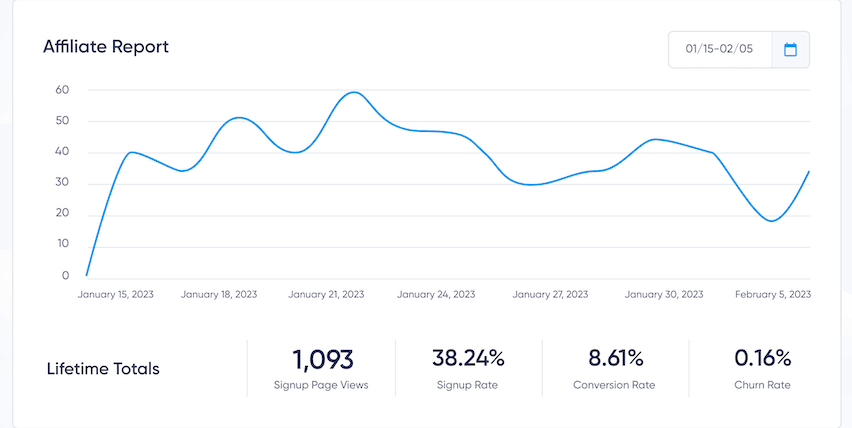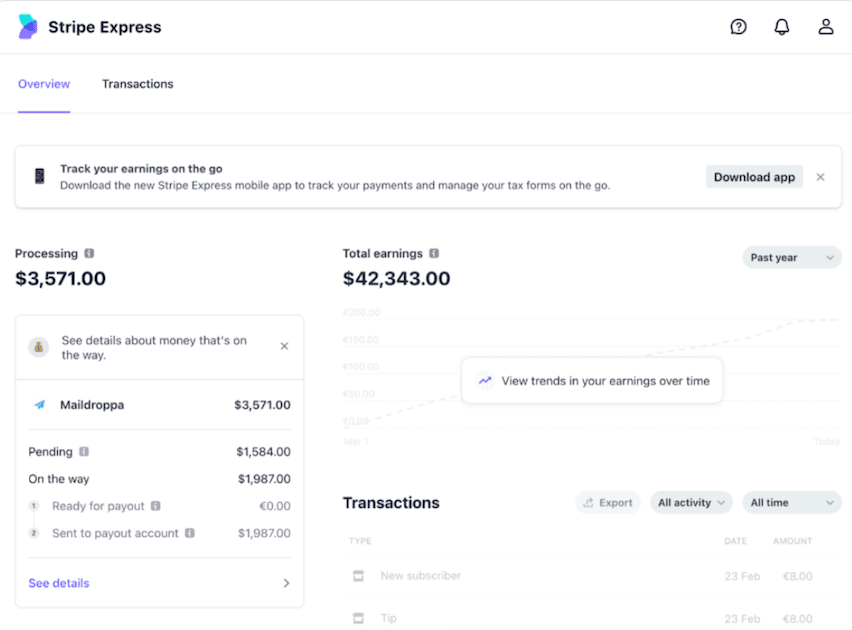Contents
the email tool that makes email marketing simple
Essential Guide to Affiliate Marketing for Startups
Published: February 5, 2025
What Is Affiliate Marketing and How Does it Work?
Affiliate marketing is a marketing scheme by which an online business pays affiliate partners a commission for business generated for a merchant.
Affiliate marketing for startups is a strategic choice, especially for those in the SaaS field. This model fosters partnerships with affiliate marketers - individuals or companies promoting your products or services. It's an effective way for startups to expand their market reach, both efficiently and cost-effectively.
Here's how it works: Startups provide affiliate marketers with unique tracking links or promotional codes. The affiliates then incorporate these links into their online content such as blog posts, social media, or videos. When a potential customer clicks on these links and completes a purchase or subscribes to a service, the affiliate earns a commission. This commission is typically a set percentage of the sale, as detailed in the affiliate agreement.
This method is especially useful for startups because it is low-risk but can yield high returns. By using affiliates' digital reach and influence, startups can reach new audiences without having to have a big marketing budget. It's a method that fits well with how today's consumers like to buy things based on trust and recommendations.
Advantages of Running Your Own Affiliate Program
For startups, starting an affiliate program is a smart move. It's not just about making more sales. It's also about growing your business in a smart, cost-effective way. Here's why it's such a good idea:
-
Affiliate marketing is budget-friendly. You only pay when you make a sale. This means you're not throwing money into ads without knowing if they'll work. It's a safe way to spend your marketing budget.
-
When you work with affiliates, you'll reach new people. These aren't just any people; they're your affiliates' followers who trust them. So, when an affiliate shares your product, it's a trusted recommendation; not just another ad.
-
Your brand gets more attention. Every time an affiliate shares your product, more people see your brand. It's not just about selling a product; it's also about making your brand better known and liked.
-
SEO, or getting found on search engines, gets a boost from affiliate marketing. When affiliates talk about your products, they often link back to your website. These links help improve your website's ranking in search results, making it easier for people to find you.
-
Working with affiliates means you're teaming up with experienced marketers who are often equipped with valuable marketing ideas. They've got the skills and audience to promote your products well and can provide you with valuable marketing tips. This is especially great if your startup doesn't have a big marketing team.
-
You get to see what's working and what's not. Affiliate platforms give you data on sales, clicks, and more. This helps you understand your customers better and plan smarter strategies.
-
Affiliate marketing is flexible. You decide how it works for your business. You set the commission rates and choose the right affiliates for your brand. This control means you can shape the program to fit your startup's goals.
-
Affiliate marketing works well with other marketing efforts. It can boost your other campaigns, like social media ads or email marketing, for even better results.
-
Affiliate marketing grows with your business. As your startup gets bigger, your partner program can too. This means it's a long-term strategy that supports your business as it evolves.
So, for startups looking to grow, affiliate marketing is a powerful tool. It's not just about immediate sales; it's about building your brand and business sustainably.
Now that we've seen the clear benefits of affiliate marketing for startups, let's see how you can get started with affiliate marketing for your startup.
How Startups Can Begin as an Affiliate Marketing Merchant
Starting an affiliate marketing program is an important step for any startup aiming to expand its reach.
The journey begins with defining your program goals. Whether it's boosting sales, enhancing brand visibility, finding new associates, or exploring new markets, having clear objectives shapes your strategy and gives you a way to measure your success. This is where you craft a roadmap for your affiliate journey, aligning the program's objectives with your business goals.
Next, the focus shifts to choosing the right affiliates. This process goes beyond just selecting partners; it involves finding allies who authentically represent and promote your brand. Utilizing tools like BuzzSumo or SEMrush can be instrumental in identifying potential affiliates with a commanding presence in your niche. The right affiliates are crucial for promoting your brand effectively and aligning with your marketing strategy.
Structuring commission models is another critical aspect. You might consider various models, such as a percentage of sales, a fixed amount per lead, or tiered incentives. The key is to strike a balance between offering attractive commissions to your affiliates and maintaining the financial viability of your business.
Setting up your affiliate marketing business involves integrating specific functionalities into your SaaS platform. This includes managing sign-ups and commissions, tracking affiliate referrals to determine which partner brought in which customers, and setting up automated commission payouts. Additionally, providing a commission overview for affiliates and implementing effective communication tools are essential for a smooth operation. Implementing these features requires technical expertise and resources, ensuring the system works seamlessly and maintains the integrity of your affiliate program.
For those without the time, knowledge, or budget to implement these functionalities in-house, there are efficient alternatives: affiliate management software and affiliate networks. These tools and platforms simplify the process of running a partner program, allowing startups to focus on core business activities.
Software to automate affiliate marketing for startups
Affiliate management software automates the creation of affiliate links, tracks sales and conversions, and manages payments to affiliates. These solutions offer customization, allowing startups to tailor their affiliate programs to align with specific marketing strategies and business goals. Some popular affiliate management software platforms include:
Post Affiliate Pro: Known for its comprehensive tracking and reporting capabilities.
Refersion: Ideal for businesses seeking to scale their partner programs efficiently.
PartnerStack: Specifically designed for SaaS companies, focusing on building strong partner relationships.
Impact: Offers advanced tracking and attribution capabilities, suitable for detailed campaign insights.
Tapfiliate: User-friendly interface and flexibility, great for startups wanting an easy-to-use platform.
AffTrack: Provides real-time tracking and reporting, catering to businesses needing instant data analysis.
TUNE (formerly HasOffers): Flexible and scalable, suitable for growing affiliate programs.
LeadDyno: Emphasizes easy setup and automation, ideal for quickly launching affiliate campaigns.
Cake: Comprehensive solution with real-time analytics for advanced tracking needs.
LinkMink: Particularly geared towards SaaS businesses, offering tailored solutions for managing affiliate relationships and tracking.
Affiliate marketing networks
Platforms like these provide a place from which where startups can connect with a wide range of affiliates ready to promote products. Networks handle much of the administrative work, including link distribution and commission payments. However, they often come with higher costs and less control over affiliate relationships. Notable networks include:
ShareASale: A well-established network with a diverse range of affiliate partners, known for its user-friendly interface and supportive environment for startups.
Commission Junction (CJ Affiliate): Offers a global affiliate base and robust tracking technology, making it suitable for startups looking to expand their reach.
ClickBank: Specializes in digital products and is known for high commission structures. It's ideal for startups in the digital product space.
AWIN: Offers a broad range of advertisers and is known for its ease of use and supportive tools for beginners, making it a good fit for startups.
FlexOffers: Features a vast collection of programs across various categories. It is known for quick payouts and an easy-to-navigate platform.
Pepperjam: Known for its modern, transparent approach, Pepperjam stands out with its simple analytics tools, making it a solid choice for startups.
Making the right choice
Startups should weigh the pros and cons of each marketing platform option. Affiliate software offers more control and is often more cost-effective, but requires more effort in finding and recruiting affiliates. Affiliate networks, on the other hand, provide a ready-made pool of affiliates but may involve higher costs and less direct control.
In the next section, we'll explore a third approach - how we at Maildroppa successfully implemented our custom made solution.
Maildroppa's Affiliate Program: Our In-House Approach
When we started using affiliate marketing at Maildroppa, our goal was simple: to grow faster without massive upfront investments. We wanted to engage influencers and creators who could help us expand our reach in the competitive email marketing industry.
Why we built our own affiliate system
At Maildroppa, we decided against using a typical affiliate software. Here's why:
Smooth Integration: We needed our affiliate system to work seamlessly with Maildroppa, providing a consistent experience for both users and affiliates.
Cost-Effectiveness: Building our system meant we could save on the fees that come with most affiliate program software. Plus, it allowed us to avoid sending our partners to another platform and kept their experience within the Maildroppa ecosystem.
Choosing stripe connect for payouts
For our affiliate payouts, we chose Stripe Connect. This was a strategic decision for several reasons:
Security and Speed: Stripe is known for its secure, fast, and reliable payment processing, essential for global transactions.
Legal Compliance: Working with Stripe ensures that our payouts comply with international legal standards.
The unexpected SEO benefit
One of the perks we didn’t fully anticipate was the SEO boost. Our affiliate partners' quality links to our site have indeed helped improve our search rankings.
A straightforward guide for you
If you're curious about how we set up and run our own affiliate program, or are thinking of starting your own, check out our Affiliate Partner Program Guide. It's a no-nonsense, detailed walkthrough of our system. If you’re in a similar startup phase and thinking about affiliate marketing, or even interested in joining our program, this guide might just be what you need.
Conclusion
Affiliate marketing presents a great opportunity for startups to expand their reach and accelerate growth. It's an approach that's especially beneficial for managing costs while building brand awareness and boosting SEO.
As you consider how to start affiliate marketing and how it can fit into your startup's growth strategy, remember that the journey is as unique as your business. If you're thinking about setting up your own program, remember that the right software can make all the difference.
We're here to share our experiences and learn from yours. If you have any questions or wish to discuss how affiliate marketing can work for your startup, feel free to get in touch. Let's collaborate and grow together in the exciting realm of affiliate marketing!



